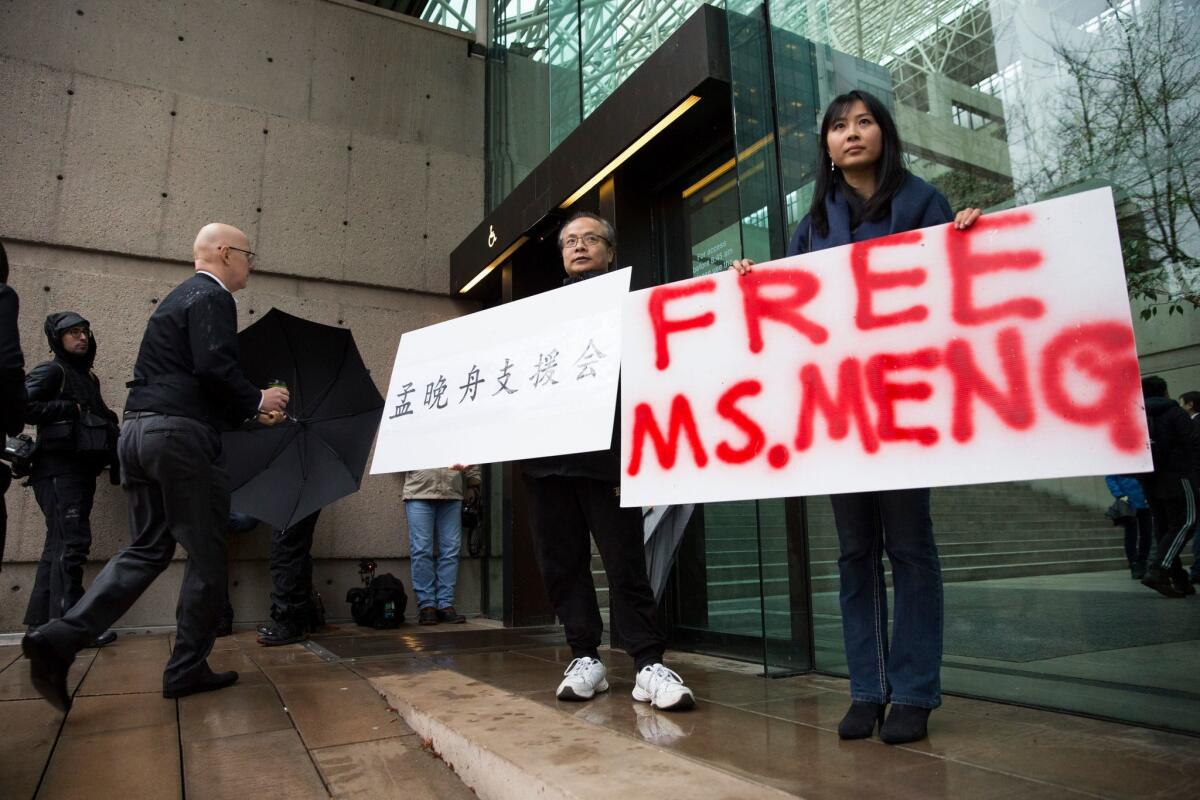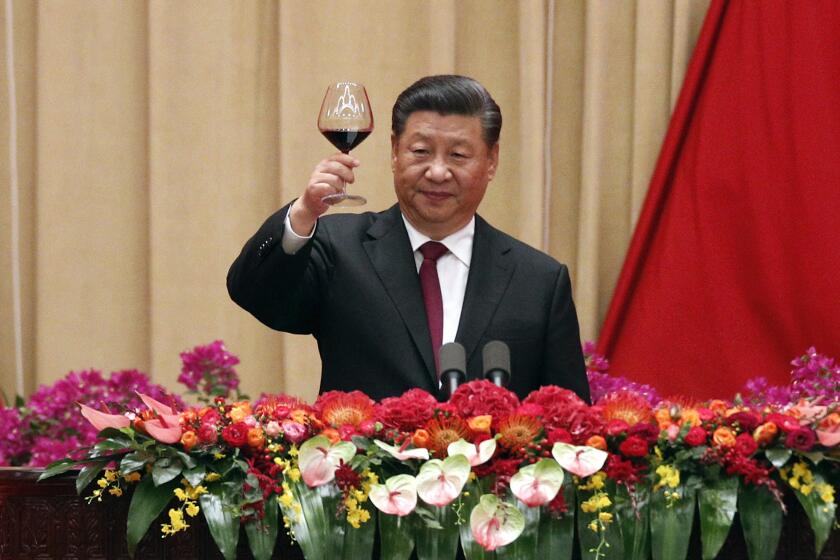Trial of Huawei executive exposes cracks in tough-to-win extradition case
- Share via
VANCOUVER — When Huawei Technologies Co.’s chief financial officer first argued that Canada had trampled on her constitutional rights during a December arrest, it rang a little hollow.
Meng Wanzhou wasn’t a Canadian citizen. She’d been detained for three hours at Vancouver’s airport. She’d been released on bail to live in one of her two multimillion-dollar homes in the Pacific coast city.
On the face of it, it didn’t appear a roughshod abuse of Canada’s Charter of Rights and Freedoms capable of derailing a U.S. extradition request.
Yet over a two-week stretch of hearings that ended Thursday, her phalanx of lawyers has exposed cracks in the way Canada handled her arrest — including an admission from border officials that “in error” they shared her device passwords with police — putting the prosecution on the back foot.
“Meng was tricked,” Scott Fenton, one of her lawyers, told the court, laying out how the Canada Border Services Agency, police and the U.S. Federal Bureau of Investigation allegedly unlawfully used the pretext of an immigration check to get Meng to disclose evidence that could be used against her.
Ren Zhengfei turned a company with no intellectual property into the world’s largest telecom and made China a global leader in 5G technology.
According to defense testimony, Meng’s warrant called for her “immediate” arrest, yet border officials detained her first for three hours, ostensibly to determine if she was admissible to Canada. However:
- There was never any chance Meng would have been turned away, given the arrest warrant awaiting her.
- Officials never formally admitted her anyway — her immigration status in Canada remains in limbo.
- They also never told her why she was being questioned. Only when arrested hours later was she advised of her right to remain silent.
Border officials say they weren’t cooperating with police or the Federal Bureau of Investigations, yet:
- They questioned her about Huawei’s business in Iran. Unbeknownst to Meng, the U.S. extradition request — based on an indictment still sealed at that time — accused her of fraud related to sanctions on Iran.
- They placed her devices in special bags to prevent them from being tampered with remotely — a specific request from the FBI and not a standard border procedure.
- They gave the passwords to all her devices to police. A CBSA official later said the passwords “were provided in error” and couldn’t be used as evidence, according to an email exhibit.
- A Canadian police officer allegedly emailed unique identifying numbers of Meng’s phones and tablet to an FBI legal attache — unlawfully sidestepping formal channels for such information sharing — which could potentially be used by the U.S. to gather more evidence against her.
Crown lawyers have either disputed or sought to downplay the significance of those points. Associate Chief Justice Heather Holmes, the presiding judge, has often seemed skeptical, grilling the prosecution.

Meng seeks a court order to force the Canadian government to release more details about her arrest. On Thursday, Holmes requested additional information from both sides to address conflicting evidence about the allegations of information sharing with the FBI attache. She isn’t expected to issue a decision until at least Oct. 16, potentially much later if the police officer or others are called for cross examination.
Ultimately, the defense is seeking to establish an abuse of process. If it’s successful, the court could halt the extradition proceedings.
For Meng, these are the first steps in a long battle in which the odds are stacked against her. Of the 798 U.S. extradition requests received since 2008, Canada has only refused or discharged eight, according to Canada’s Department of Justice.
Still, she’s approaching the initial test with flair.
The executive — who wore an Abercrombie & Fitch hoodie in her mug shot and preferred yoga pants and sneakers at earlier proceedings — has shown up daily in four-inch stilettos and designer dresses flaunting the GPS tracker on her left ankle. She used to scurry to her car with a wool cap pulled low over her eyes, but now strides each morning out the gates of her $9.8-million property with her coat off despite the chill, allowing photographers to take pictures of her.
She stopped for her first interview with a Chinese-language TV crew to remark on the 70th anniversary of Communist Party rule.
President Xi Jinping leads a parade designed to send a confident message that China’s military has modernized rapidly, amassing advanced military technology to rival U.S. power.
There’s a certain irony in the glamour offensive. Two Canadians detained in China within days of Meng’s arrest, Michael Kovrig and Michael Spavor, are being held in isolation with only sporadic access to consular officials. Meng’s arrest and the detentions of Kovrig and Spavor have plunged the relationship between Canada and its second-biggest trading partner into its darkest period since diplomatic ties were established in 1970 — with almost no hope of a detente.
Meanwhile, the case continues to offer glimpses into the persona and life of a woman who was virtually unknown until her arrest, despite being the eldest daughter of Huawei’s billionaire founder Ren Zhengfei.
Until December, Meng had never had any run-in with the law, not even a traffic violation. In addition to the two Vancouver homes, she has two in Hong Kong, one in Shenzhen and three in London, which she rents out. She’s a titan of business with a penchant for accessorizing just about everything: a Winnie-the-Pooh sticker on her iPad, a pastel puffball on her backpack, even a cherry blossom charm on her USB stick.
Meng’s high-profile case brings to the fore growing criticism that Canada’s border agency operates amid scant oversight and outdated laws. In June, an Ontario court censured the CBSA for its “serious, long-standing and systemic” approach to searching electronic devices.
A December 2017 report by the parliamentary ethics committee criticized how the agency treats such devices in the same way it inspects a bag of underwear, and called for new laws on device searches at borders.
“They say they don’t, but the law, if applied as they say it is, would allow them to do it on a whim. We say this is likely unconstitutional,” David Fraser, a privacy lawyer representing the Canadian Bar Assn., told the committee.
More to Read
Inside the business of entertainment
The Wide Shot brings you news, analysis and insights on everything from streaming wars to production — and what it all means for the future.
You may occasionally receive promotional content from the Los Angeles Times.











